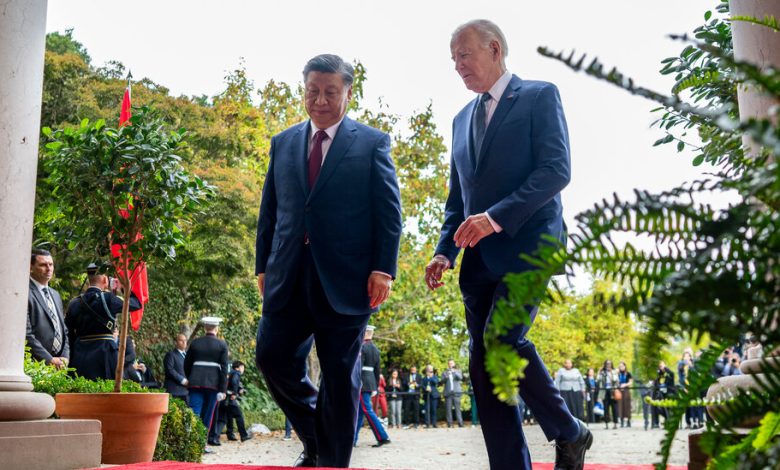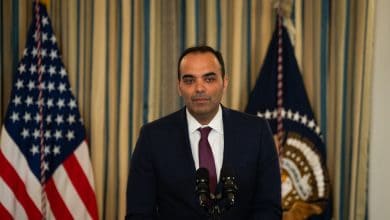What the Biden-Xi Talks Accomplished (and Didn’t)


Xi Jinping of China and President Biden are seeking to stabilize relations between the world’s two biggest economies.Credit…Doug Mills/The New York Times
Biden and Xi try direct diplomacy
The mood music was upbeat but pragmatic after the first face-to-face meeting in a year between President Biden and his Chinese counterpart, Xi Jinping. There was no joint communiqué after Wednesday’s talks, but both sides issued positive statements trumpeting where they found common ground, including on tackling climate change and improving communications.
The San Francisco summit, and Xi’s banquet with American business leaders afterward, were signs of how entwined the economies remain despite years of rising tensions — and why both sides and many U.S. companies don’t want the relationship spiraling into a more serious conflict.
Biden and Xi found room for cooperation. The leaders agreed to restart military communications that were suspended last year after Nancy Pelosi, then speaker of the House, visited Taiwan. Biden said they had made progress on curbing Chinese production of the opioid fentanyl.
But there was plenty they didn’t agree upon. Xi complained that U.S. export controls on advanced technology, such as semiconductors, were intended to suppress China. Biden’s effort to enlist Beijing as a kind of peacekeeper in the Middle East — specifically, putting pressure on Iran to not escalate the Israel-Hamas war — was unsuccessful.
And the two sides didn’t make much progress on systems to ban the use of artificial intelligence to manage their nuclear arsenals, agreeing only that their officials would keep talking.
Xi got a standing ovation from top American business executives. Larry Fink of BlackRock and Steve Schwarzman of Blackstone reportedly sat at the Chinese leader’s table. The exclusive dinner at the Hyatt Regency hotel also included Tim Cook of Apple, Albert Bourla of Pfizer and Ray Dalio of the hedge fund Bridgewater Associates. Xi’s message: China is a market that’s open to foreign business.
Xi wants to portray China as a friend to foreign companies — because he needs them. The Chinese economy is struggling and foreign direct investment recently hit a 25-year low. A meeting with American corporate leaders is a good image to project to his audience back home.
But Western businesses say it’s tougher to operate there, with many rethinking their supply chains or pulling out altogether.
Yet the dinner showed that many aren’t ready to quit China. For all of the talk about decoupling and de-risking, “China is still enormously important for just about any multinational you can think of,” Richard McGregor, a China expert at the Lowy Institute, an Australia-based think tank, told DealBook. “They might not be investing as much, but they’re not getting out. And it’s a market they can’t ignore and have to try and manage.”
The DealBook Summit is on Nov. 29. Among the guests are Vice President Kamala Harris; Elon Musk of SpaceX, Tesla and X; and Jensen Huang of Nvidia. You can apply to attend here.
HERE’S WHAT’S HAPPENING
Israel and Hamas appear closer to a hostage deal. Israeli officials say the proposal would see the group free about 50 women and children in exchange for a pause in fighting and the release of roughly the same number of Palestinian women and children held in Israeli prisons.
The Senate approves a spending bill that would keep the government open. The measure would keep the federal government funded through early next year, clearing the way for President Biden to sign the legislation. But the bill excludes more contentious items, including aid for Ukraine and Israel, and Congress will have to negotiate again on funding in a few months.
Another activist investor targets Disney. ValueAct Capital has amassed a stake in the entertainment giant, DealBook hears, confirming a report by 13D Monitor. It joins Nelson Peltz’s Trian in seeking to shake up Disney amid investor dissatisfaction with the company’s performance.
Microsoft introduces its own A.I. chips. The semiconductors, which will be used in the company’s Azure cloud data centers, are the latest effort by the tech industry to reduce its dependence on chips from Nvidia for their artificial intelligence applications. Shares in Arm, whose designs are powering the Microsoft chips, jumped nearly 4 percent on the news on Wednesday.
Too close to call
The fate of the United Automobile Workers union’s tentative contract with General Motors, won after a hard-fought strike, now looks uncertain. Workers at the automaker have unexpectedly pushed back against the terms, prolonging the drama around the Detroit auto industry.
The final tally on the contract could be a squeaker, with results expected as soon as Thursday. Veteran G.M. workers have opposed the deal, which would raise the top wage by 25 percent, to more than $40 per hour over the next four and a half years, as well as offer cost-of-living adjustments and more generous pension and retirement plans.
A majority of workers at several G.M. plants in Michigan, Indiana and Tennessee rejected the proposal, while those at a large sport utility vehicle plant in Arlington, Texas, voted yes. (A simple majority is needed for ratification.)
One G.M. worker told The Times that he rejected the agreement because it didn’t include retiree health benefits. “I’m not voting yes on any contract that doesn’t have that in it because I don’t need the health care when I’m 25 — I’m 65,” he said.
Workers at Ford and Stellantis seem set to approve the deal. That appears to validate the U.A.W.’s decision to strike at all three automakers this fall to exert more pressure, creating a work stoppage that cost the companies billions of dollars.
That hardball strategy, coupled with similarly tough moves by unions of Hollywood screenwriters and actors, helped workers in both industries achieve some of their biggest wage gains and benefits increases in decades.
But those concessions won’t matter if union members won’t accept them. That could create issues for the U.A.W. as well as G.M. Shawn Fain, the union’s president, has hoped to build on the victory by seeking to organize workers at nonunionized automakers like Tesla and Toyota.
The White House could also suffer blowback. President Biden has embraced a pro-union stance as part of his 2024 re-election campaign, including by taking the extraordinary step of joining its picket line in September. Last week, he joined Fain at a Stellantis factory in Illinois, where — wearing a U.A.W. T-shirt — he lauded the union’s gains.
But his position could become thorny if G.M. workers reject their union’s deal. And any disruption that arises from new labor tension could compound voters’ concerns about his handling of the economy.
Musk takes heat for comments about hate speech, again
As corporate America rushes to stand up against antisemitism amid the Israel-Hamas war, Elon Musk is taking a different tack.
The billionaire on Wednesday reignited concerns about his efforts to combat antisemitism with a series of replies to posts on X, the social network he owns, criticizing the Anti-Defamation League, a Jewish advocacy group, and seemingly endorsing a claim that some Jewish communities are pushing hate speech.
“You have said the truth,” Musk wrote in a reply to an X post that said Jewish communities “have been pushing the exact kind of dialectical hatred against whites that they claim to want people to stop using against them.” (The author of the original post has since limited who can see it.)
Musk added, without citing evidence, that the A.D.L. “unjustly attacks the majority of the West, despite the majority of the West supporting the Jewish people and Israel.” He later said that not all Jewish communities promote hate, but reiterated that the A.D.L. and similar groups are pushing “de facto anti-white racism or anti-Asian racism or racism of any kind.”
The A.D.L., which did not appear to respond to Musk’s latest charge, on Wednesday called out the “record levels” of hate speech generated in online forums and social media.
It’s the latest instance of Musk taking aim at the A.D.L., which is one of several groups cataloging hate speech on X. The social network has faced criticism over a surge in racist, antisemitic and other harmful content since Musk took over last year, charges that the tech mogul has strongly disputed. “The @ADL has been trying to kill this platform by falsely accusing it & me of being anti-Semitic,” he wrote in September. He later threatened to sue the organization for hurting X’s revenue; the two sides later backed down.
The controversy is unlikely to help X’s already embattled business, which many advertisers had abandoned after upheaval at the company and a weakening of its content moderation teams and policies. Last month, X disclosed that it now valued itself at $19 billion, a fraction of the $44 billion that Musk paid for the company.
-
In other Musk news: He denied a report by Bloomberg that SpaceX was weighing an initial public offering of its Starlink satellite internet service as soon as next year.
THE SPEED READ
Deals
-
EY named Janet Truncale as its next global C.E.O., making her the first woman to lead a Big Four accounting firm. (FT)
-
Documents reportedly show that 777 Partners, an obscure Miami-based investment firm, used $1.5 billion of cash from customers of an insurer it controls to bid for European soccer teams and other risky assets. (Semafor)
-
Mars agreed to buy Hotel Chocolat, a high-end British chocolatier, for $662 million. Relatedly, the news release inadvertently disclosed the deal’s code names. (BBC, FT Alphaville)
-
Gawker, the twice-shuttered internet gossip site, has been sold again, this time to a Singaporean music entrepreneur. (Variety)
Policy
-
Letitia James, New York’s attorney general, sued PepsiCo, accusing it of endangering wildlife and misleading the public about its goals to eliminate single-use plastic in its packaging. (NYT)
-
“How R.F.K. Jr. Has Turned His Public Crusades Into a Private Windfall” (NYT)
-
Short sellers like Carson Block and Nate Anderson are sharing their research into potentially shady situations with the S.E.C. — in hopes of getting paid for their tips. (Bloomberg)
Artificial intelligence
-
Companies tasked with helping to train artificial intelligence models are inadvertently hiring young teens for the work, often exposing them to traumatic content. (Wired)
-
“Can A.I. solve medical mysteries? It’s worth finding out.” (WaPo)
Best of the rest
-
Rupert Murdoch is officially stepping down from his media empire this week, but he said he planned to maintain an “active role” in the business. (CNN Business)
-
The founders of IRL, a social media app, sued SoftBank and other investors for falsely claiming that the platform was full of bots as a pretext for shutting it down. (FT)
-
“Google Activists Circulated Internal Petition on Israel Ties. Only the Muslim Got a Call from HR.” (The Intercept)
We’d like your feedback! Please email thoughts and suggestions to [email protected].




